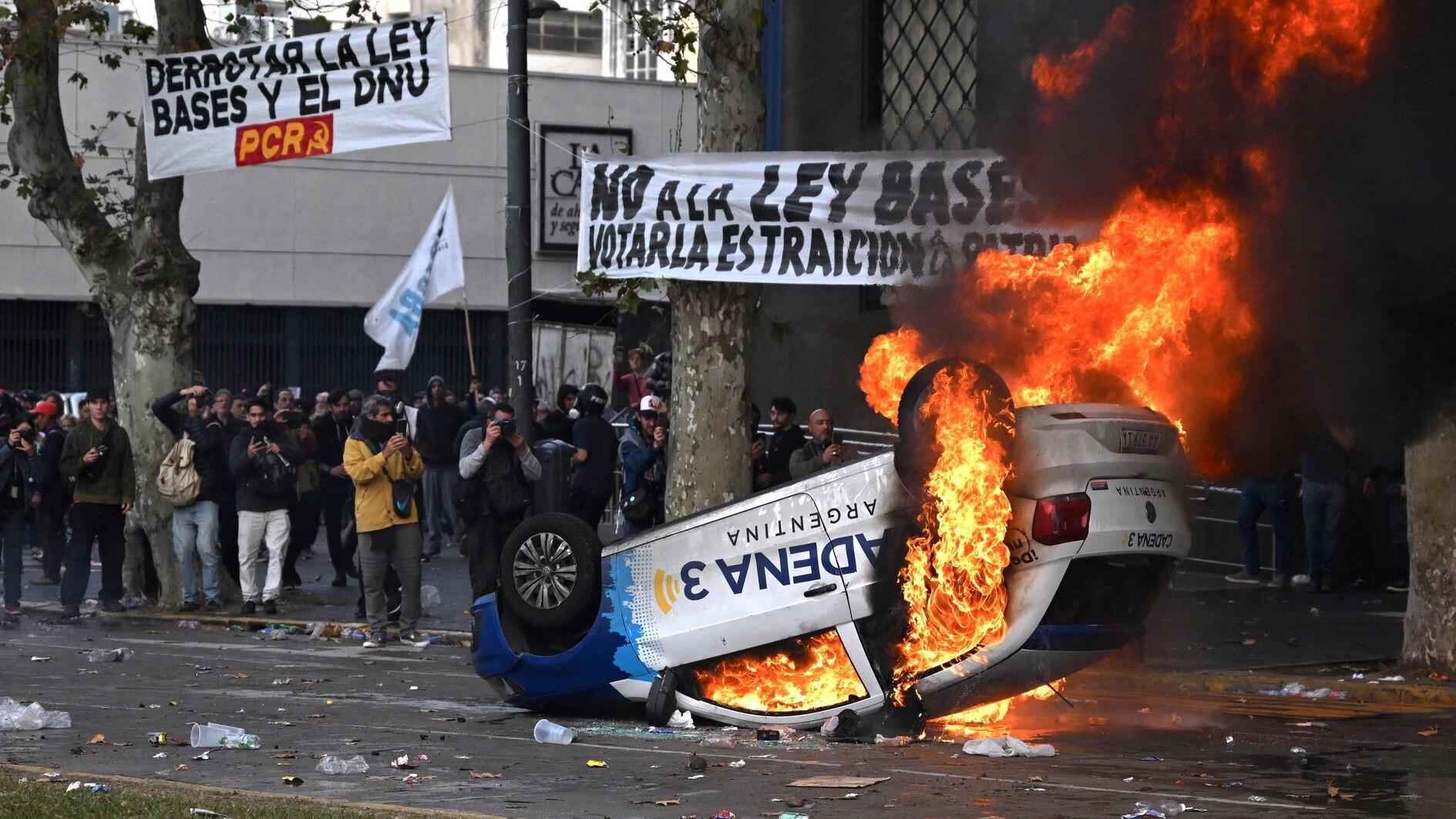
Argentine President Javier Milei's controversial economic reform package narrowly won preliminary Senate approval late Wednesday, after police and protesters violently clashed outside Congress throughout the day.
Lawmakers for hours on Wednesday debated a swath of liberalizing reforms proposed by the budget-slashing president, while security forces fired tear gas and water cannon at rioting demonstrators outside.
Late in the evening, the package won approval "in general" in the Senate, an important step for Milei's effort to finally get his flagship reforms across the finish line.
"For those Argentines who suffer, who wait, who do not want to see their children leave the country... my vote is affirmative," Argentine vice president and Senate leader Victoria Villaruel said after breaking the 36-36 tie in the chamber.
The bill's separate articles were now being addressed point by point in a process expected to continue into the early hours of Thursday. If approved in a full vote, the measure returns to the lower house for a final green light.
Rubber bullets, pepper spray
Scuffles broke out earlier when protesters tried to bypass a system of fences set up between them and Congress. Officers used rubber bullets and pepper spray against the rioters, who responded by lobbing stones at the police.
Seven people, including five lawmakers among the protesters, were treated at hospital after being pepper sprayed, according to the health ministry.
Dozens of others received medical attention at the scene.
Later, as night fell, thick blocks of shield-bearing officers and others on motorbikes pushed back the protesters, who overturned two cars — one of which belonged to a local media organization — and set them on fire.
At least 10 people were arrested and nine police officers were injured, a spokesman for the Ministry of Security told AFP.
In one scene, a lone protester stood and held his hand in military salute as he faced a phalanx of police in riot gear, with smoke from cannisters swirling around him.
The office of the president on X denounced "the terrorist groups that with sticks, stones and even grenades, tried to perpetrate a coup d'etat."
Inside Congress, senators were debating what remains of Milei's flagship reform bill — rejected in its original form and approved with major changes by the lower house Chamber of Deputies in April.
'Back 100 years'
The whittled-down bill has 238 articles — slimmed from an initial 600-plus.
The measures include declaring a one-year state of economic emergency, allowing Milei to disband federal agencies, and privatizing about a dozen public companies including state-owned carrier Aerolineas Argentina.
Others deal with reducing access to minimum retirement allowances and weakening labor protections — slammed by left-wing opponents as a license to fire workers.
The provisions also envision tax, customs and foreign exchange incentives to encourage investment in the country wracked by economic crisis.
Prior to the bill's preliminary Senate approval, opposition lawmakers took to the floor claiming it would reverse decades of progress.
The labor reforms, in particular, "take us back to the last century when the employee had no labor rights," said opposition senator Mariano Recalde.
The measure is opposed by social organizations, leftist political parties, retirees, teachers and labor unions.
"We cannot believe that in Argentina we are discussing a law that will put us back 100 years," said Fabio Nunez, a 55-year-old lawyer among the protesters.
Milei's party is in the minority in both houses of Congress, which he has described as a "nest of rats," and the president has not had any legislation passed since taking office last December.
The self-declared "anarcho-capitalist" won November elections vowing to take a chainsaw to public spending and eliminate the budget deficit.
By decree, he has halved the cabinet, slashed 50,000 public jobs, suspended new public works contracts and ripped away fuel and transport subsidies even as wage-earners lost a fifth of their purchasing power and annual inflation approached 300 percent.
Economy Minister Luis Caputo insisted Tuesday the bill is "an accelerator, an enabler of economic recovery."
The debate is taking place with the economy mired in recession, amid a slump in construction, manufacturing and consumption.